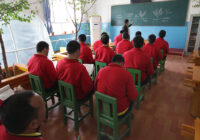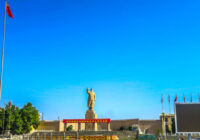Beijing’s attempt to strip Uighur Muslims of their identity, of their religion and of what they stand for is nothing short of a cultural genocide.
According to numerous reports by human rights groups and the media, over a million Uighur Muslims are being held in detention camps in China’s Xinjiang province as part of the government’s crackdown against the ethnic minority. As world leaders remain largely silent on the issue, human rights abuses continue unabated, with Uighur Muslims being made to denounce their faith and identity, and embrace the Chinese Communist Party. In this so-called re-education program, inmates are isolated from their families, subjected to brainwashing and in some cases torture, with reports of deaths in detention.
Uighurs visiting China have been placed in internment camps, with cases of 17 missing Australian Uighur Muslims coming to light just last month. Claims by Chinese officials that these “vocational training centers” are an attempt to tackle religious extremism are contradicted by countless examples that prove this is far form the truth.
The Xinjiang Autonomous Uighur Region, as it is officially known, is home to some 8 million Turkic-speaking Uighurs, with a history of unrest and discord between the Chinese authorities, the ethnic Han majority and the Uighur Muslim population, which has been kept under tight controls and restrictions. The Republic of East Turkestan briefly called for independence in 1949 before being absorbed into Communist China. In an attempt to restrict Uighur Muslims from following their faith or expressing their identity, China introduced policies that include legislation prohibiting Islamic names. In July 2014, the Xinjiang government banned Uighur Muslims from fasting during the holy month of Ramadan and has cracked down on mosques and Islamic schools.
The crackdown further heightened when Human Rights Watch found that Uighur Muslims were being kept under strict surveillance and were being made to give DNA and biometric samples. It was reported that a Chinese surveillance company has been tracking the movements of 2.5 million Uighur Muslims in Xinjiang and recording the location data of the residents.
Justification for Crackdown
The terrorist attack on Tiananmen Square in 2013 that killed five people further heightened tensions, with the Turkistan Islamic Party being the first group to claim responsibility. A decades-long Uighur insurgency has been connected to attacks both inside and outside China, including the mass stabbing at Kunming railway station in 2014 and the 2015 bombing of a shrine in Bangkok popular with Chinese tourists. An Uighur link surfaced in the 2016 suicide attack on the Chinese embassy in Bishkek, Kyrgyzstan, and Uighur militants from Xinjiang thought to be fighting alongside the Islamic State in Syria and Iraq have vowed that “In retaliation for the tears that flow from the eyes of the oppressed, we will make your blood flow in rivers, by the will of God.”
This threat of extremism has provided a justification for a further crackdown on the Uighur population, prompting China to pass its first counterterrorism legislation in 2015, which set out vague descriptions of what the People’s Republic of China considers to be extremism. Article 9 of the law outlines “spreading religious fanaticism through irregular beards or name selection.” However, despite the fact that the Chinese government reported that Uighur militant groups such as the East Turkestan Islamic Movement had links with al-Qaeda and the Islamic State, the exact number of Uighur jihadists is unknown, and experts have questioned their ability to carry out attacks inside China. At the same time, rights groups and Uighur exiles blame repressive policies and restrictions against Uighur Muslims for driving them out of China and fueling the unrest and radicalization in Xinjiang.
When individuals are detained for being visibly Muslim, wearing a headscarf or for saying their five daily prayers, it becomes apparent that this is not about “re-education” or tackling extremism, but rather an attempt to strip Uighur Muslims of their identity, of their religion and of what they stand for — a cultural genocide.
It is heartbreaking to see the plight of Uighurs and their children, many of whom have been separated from each other, not knowing where their loved ones are. China has blocked those in the camps from contact with their families. Amina Allahberdi, a 32-year-old Uighur Muslim and Saudi national, was on a visit China to renew her passport in 2016 when she was detained and prevented from returning to Saudi Arabia. Her husband had spent a month in search of her but had to return back to Saudi Arabia to care for his two children. In an emotional video, Allahberdi’s 5-year-old son cries for their missing parent; “My mother is from East Turkestan. When she went back home, China sent her to prison and we haven’t heard from her since,” the children say. These are just two of the many Uighur children who have lost their parents to these camps.
Journalists who tried to investigate the camps have been reported missing or sent to prison. Gheyret Niyas, an Uighur journalist, was sentenced to 15 years for endangering state security. The Chinese government only allows a limited number of journalists the right to visit the camps. Any claims of abuse by Uighur Muslims are explicitly dismissed by the Chinese authorities and branded as lies. However, the growing amount of evidence and corroborating statements of abuse prove otherwise.
Cries for Action
Kenneth Roth, the executive director of Human Rights Watch, stated that “The abuse in Xinjiang today is so severe that it cries out for international action.” World leaders must speak out against the injustices that President Xi Jinping has inflicted on China’s Uighur minority and hold those accountable in the eyes of international law. The only way that this can be done is if the United Nations Human Rights Council adopts a resolution to establish a thorough investigation. The United Nations have had a few successes, such as getting South Africa and Kazakhstan to give up their nuclear weapons, or persecuting Charles Taylor and Slobodan Milosevic for war crimes. A UN-mandated investigation would enable the high commissioner for human rights to carry out an independent inquiry. China should have to agree to having an unrestricted investigation in Xinjiang.
China can’t hide behind its economic power to escape accountability over its human rights violations. Uighur Muslims should have a right to practice their religion as mandated by Article 36 of the Chinese Constitution, which states that people have the right to “enjoy freedom of religious belief.” They should have the right to not be scrutinized for carrying a copy of the Quran, wearing a headscarf or donning a long beard as part of their faith.
China has had multiple opportunities to answer serious allegations of human rights abuse against Uighurs, such as those issued by Turkish President Recep Tayyip Erdoǧan. Yet the authorities continue to lie and deny the true nature of the situation.
No country in the world should be allowed to get away with the human rights abuses that China has inflicted on its own citizens. Uighur Muslims have faced repression from the Chinese authorities for far too long, and it is time now for Beijing to be held accountable and for justice to prevail — even if it means bringing the world’s second largest economy to shame.
The views expressed in this article are the author’s own and do not necessarily reflect Fair Observer’s editorial policy.
Support Fair Observer
We rely on your support for our independence, diversity and quality.
For more than 10 years, Fair Observer has been free, fair and independent. No billionaire owns us, no advertisers control us. We are a reader-supported nonprofit. Unlike many other publications, we keep our content free for readers regardless of where they live or whether they can afford to pay. We have no paywalls and no ads.
In the post-truth era of fake news, echo chambers and filter bubbles, we publish a plurality of perspectives from around the world. Anyone can publish with us, but everyone goes through a rigorous editorial process. So, you get fact-checked, well-reasoned content instead of noise.
We publish 2,500+ voices from 90+ countries. We also conduct education and training programs
on subjects ranging from digital media and journalism to writing and critical thinking. This
doesn’t come cheap. Servers, editors, trainers and web developers cost
money.
Please consider supporting us on a regular basis as a recurring donor or a
sustaining member.
Will you support FO’s journalism?
We rely on your support for our independence, diversity and quality.






